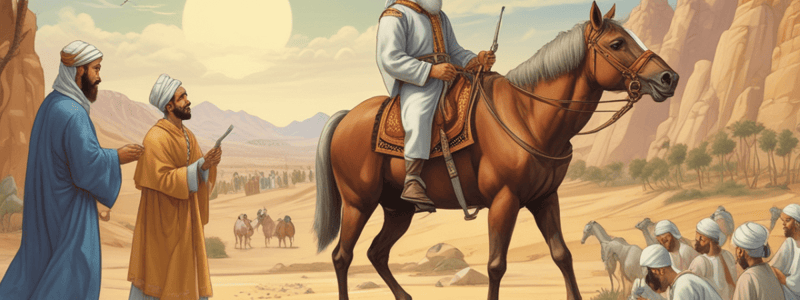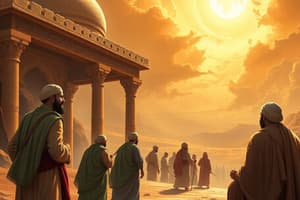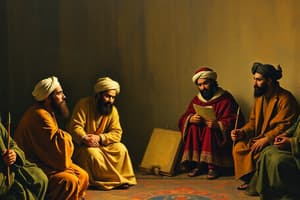Podcast
Questions and Answers
What was the significance of the Prophet's marriages in Arab tradition?
What was the significance of the Prophet's marriages in Arab tradition?
What was Umm Habiba's relationship to Abu Sufyan?
What was Umm Habiba's relationship to Abu Sufyan?
What was the outcome of the Battle of Benin?
What was the outcome of the Battle of Benin?
What did Juwayriyya offer to pay to free herself from captivity?
What did Juwayriyya offer to pay to free herself from captivity?
What did Juwayriyya have three days before the Battle of Benin?
What did Juwayriyya have three days before the Battle of Benin?
Who attempted to overthrow the Prophet Muhammad (peace be upon him)?
Who attempted to overthrow the Prophet Muhammad (peace be upon him)?
What was the result of the Prophet Muhammad's (peace be upon him) marriage to Juwairiya?
What was the result of the Prophet Muhammad's (peace be upon him) marriage to Juwairiya?
What did Juwairiya's father, Al-Harith, come to Medina to do?
What did Juwairiya's father, Al-Harith, come to Medina to do?
What is Juwairiya known for?
What is Juwairiya known for?
What did the Prophet Muhammad (peace be upon him) teach Juwairiya?
What did the Prophet Muhammad (peace be upon him) teach Juwairiya?
Flashcards are hidden until you start studying
Study Notes
The Prophet's Marriages and Reconciliation
- The Prophet's marriages had a special divine wisdom and served as a means of reconciliation between tribes.
- In Arab tradition, marrying a noble woman from another tribe was a way to reconcile between tribes.
The Prophet's Marriage to Umm Habiba
- Umm Habiba was the daughter of Abu Sufyan, a hostile tribe leader, and was an early Muslim who migrated to Abyssinia.
- The Prophet conducted her marriage in Abyssinia, but they were not united until much later.
- Abu Sufyan was initially thrilled about his daughter's marriage to the Prophet, which softened his heart towards him.
The Battle of Benin and the Prophet's Marriage to Juwayriyya
- The tribe of Benin, located between Mecca and Medina, was hostile towards the Prophet and joined Quraysh in their hostility.
- The Prophet received news of a plot to attack the Muslims and launched a preemptive attack, defeating the Benin tribe.
- The Prophet's army seized spoils of war, including 2,000 camels, 600 goats, and 100 families taken captive, including Juwayriyya, the daughter of the chief of Benin.
Juwayriyya's Story
- Juwayriyya had a dream three days before the battle, which she didn't understand, but later interprets as a sign of her marriage to the Prophet.
- Her father escaped, and her husband was killed in the battle.
- She demanded a ransom to free herself from captivity, offering to pay 7 okes of silver, but the Prophet eventually married her instead.
The Slander and Its Aftermath
- Abdullah, the chief of the hypocrites, attempted to overthrow the Prophet and turned people against each other.
- Allah exposed his plan and foiled the coup.
- The slander against Aisha, the Prophet's wife, occurred during this time, which the Prophet eventually cleared her of.
Key Individuals
-
Umm Habiba: daughter of Abu Sufyan, an early Muslim, and one of the Prophet's wives.
-
Juwayriyya: daughter of the chief of Benin, taken captive in the Battle of Benin, and later married the Prophet.
-
Abdullah: the chief of the hypocrites who attempted to overthrow the Prophet.### The Story of Juwairiya bint Al-Harith
-
Juwairiya bint Al-Harith was the daughter of the leader of the Banu Mustaliq tribe.
-
She was captured during a battle and was brought to the Prophet Muhammad (peace be upon him) as a captive.
-
She offered to ransom herself, but the Prophet Muhammad (peace be upon him) proposed an alternative: marrying her or ransoming her.
-
She chose to marry the Prophet Muhammad (peace be upon him), and as a result, all the captives of the Banu Mustaliq tribe were freed.
The Generosity of the Prophet Muhammad (peace be upon him)
- The Prophet Muhammad (peace be upon him) showed generosity and kindness to Juwairiya and her people.
- He freed all the captives of the Banu Mustaliq tribe, which led to many of them embracing Islam.
Juwairiya's Father
- Juwairiya's father, Al-Harith, did not know that his daughter had married the Prophet Muhammad (peace be upon him).
- He gathered his wealth and came to Medina to ransom his daughter, unaware of her marriage.
- When he arrived, the Prophet Muhammad (peace be upon him) revealed that he knew about the two hidden camels, which led Al-Harith to declare his faith and embrace Islam.
Juwairiya's Life
- Juwairiya became a righteous worshiper, known for her fasting, praying, and remembrance of Allah.
- She was distinguished by her asceticism, giving away her possessions and food, and not keeping anything for herself.
- She was praised by the Prophet Muhammad (peace be upon him) for her worship and remembrance of Allah.
The Prophet Muhammad's (peace be upon him) Gift to Juwairiya
- The Prophet Muhammad (peace be upon him) taught Juwairiya a special remembrance of Allah, "Subhan Allahi wa bihamdihi, adada khalqihi wa rida nafsihi, wa zinata 'arshihi, wa midada kalimatihi" (Glory be to Allah, and praise to Him, as much as the number of His creations, as much as pleases Him, as much as the weight of His throne, and as much as the ink of His words).
- This remembrance is equivalent to her hours of worship and is a gift to the entire ummah.
Juwairiya's Life After the Prophet Muhammad (peace be upon him)
- Juwairiya lived a life of remembrance and worship, avoiding conflict and fitna.
- She was scorned and put down by others due to her status as a former captive, but the Prophet Muhammad (peace be upon him) would comfort and uplift her.
- She died 56 years after the Hijra, leaving behind a legacy of worship and remembrance of Allah.
The Prophet's Marriages and Reconciliation
- The Prophet's marriages had a special divine wisdom and served as a means of reconciliation between tribes.
- In Arab tradition, marrying a noble woman from another tribe was a way to reconcile between tribes.
The Prophet's Marriage to Umm Habiba
- Umm Habiba was the daughter of Abu Sufyan, a hostile tribe leader, and was an early Muslim who migrated to Abyssinia.
- The Prophet conducted her marriage in Abyssinia, but they were not united until much later.
- Abu Sufyan was initially thrilled about his daughter's marriage to the Prophet, which softened his heart towards him.
The Battle of Benin and the Prophet's Marriage to Juwayriyya
- The tribe of Benin, located between Mecca and Medina, was hostile towards the Prophet and joined Quraysh in their hostility.
- The Prophet received news of a plot to attack the Muslims and launched a preemptive attack, defeating the Benin tribe.
- The Prophet's army seized spoils of war, including 2,000 camels, 600 goats, and 100 families taken captive, including Juwayriyya, the daughter of the chief of Benin.
Juwayriyya's Story
- Juwayriyya had a dream three days before the battle, which she didn't understand, but later interprets as a sign of her marriage to the Prophet.
- Her father escaped, and her husband was killed in the battle.
- She demanded a ransom to free herself from captivity, offering to pay 7 okes of silver, but the Prophet eventually married her instead.
The Slander and Its Aftermath
- Abdullah, the chief of the hypocrites, attempted to overthrow the Prophet and turned people against each other.
- Allah exposed his plan and foiled the coup.
- The slander against Aisha, the Prophet's wife, occurred during this time, which the Prophet eventually cleared her of.
Key Individuals
- Umm Habiba: daughter of Abu Sufyan, an early Muslim, and one of the Prophet's wives.
- Juwayriyya: daughter of the chief of Benin, taken captive in the Battle of Benin, and later married the Prophet.
- Abdullah: the chief of the hypocrites who attempted to overthrow the Prophet.
The Story of Juwairiya bint Al-Harith
- Juwairiya bint Al-Harith was the daughter of the leader of the Banu Mustaliq tribe.
- She was captured during a battle and was brought to the Prophet Muhammad as a captive.
- She offered to ransom herself, but the Prophet proposed an alternative: marrying her or ransoming her.
The Generosity of the Prophet Muhammad
- The Prophet Muhammad showed generosity and kindness to Juwairiya and her people.
- He freed all the captives of the Banu Mustaliq tribe, which led to many of them embracing Islam.
Juwairiya's Father
- Juwairiya's father, Al-Harith, did not know that his daughter had married the Prophet Muhammad.
- He gathered his wealth and came to Medina to ransom his daughter, unaware of her marriage.
- When he arrived, the Prophet Muhammad revealed that he knew about the two hidden camels, which led Al-Harith to declare his faith and embrace Islam.
Juwairiya's Life
- Juwairiya became a righteous worshiper, known for her fasting, praying, and remembrance of Allah.
- She was distinguished by her asceticism, giving away her possessions and food, and not keeping anything for herself.
- She was praised by the Prophet Muhammad for her worship and remembrance of Allah.
The Prophet Muhammad's Gift to Juwairiya
- The Prophet Muhammad taught Juwairiya a special remembrance of Allah, "Subhan Allahi wa bihamdihi, adada khalqihi wa rida nafsihi, wa zinata 'arshihi, wa midada kalimatihi" (Glory be to Allah, and praise to Him, as much as the number of His creations, as much as pleases Him, as much as the weight of His throne, and as much as the ink of His words).
Studying That Suits You
Use AI to generate personalized quizzes and flashcards to suit your learning preferences.
Description
Learn about the Prophet's marriages as a means of reconciling between tribes, with a focus on his marriage to Umm Habiba.




